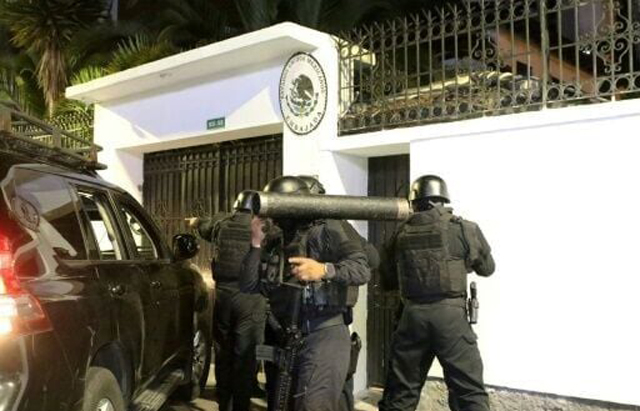Ecuador in diplomatic storm after raid at Mexican embassy
07 Apr 2024, 09:15 | BSS

QUITO, April 7, 2024 (BSS/AFP) - Ecuador faced criticism from the UN and across Latin America on Saturday after its security forces stormed the Mexican embassy in Quito to arrest graft-accused former vice president Jorge Glas, who had been granted political asylum there.
Special forces equipped with a battering ram surrounded the embassy, and at least one agent scaled the walls, in an almost unheard-of raid on diplomatic premises that are considered inviolable sovereign territory.
The incident Friday night prompted Mexico to quickly sever diplomatic ties with Ecuador.
"This is a flagrant violation of international law and the sovereignty of Mexico," President Andres Manuel Lopez Obrador wrote on X.
Nicaragua followed suit, citing the "unusual and reprehensible action" of the embassy raid.
Searing rebukes poured in from regional governments across the political spectrum, including Argentina, Bolivia, Brazil, Chile, Colombia, Cuba, Peru and Venezuela.
UN Secretary-General Antonio Guterres was "alarmed" by the raid, and urged both sides to show moderation in resolving the dispute, his spokesman said.
Lopez Obrador said authorities "forcibly entered" the building to arrest Glas, who is wanted on corruption charges and had been at the embassy since December before being granted asylum on Friday.
He said he would file a complaint against Ecuador at the International Court of Justice.
President Daniel Noboa "broke all the behavioral blueprints of traditional diplomacy," Roberto Beltran Zambrano, a professor of conflict management at Ecuador's Private Technical University of Loja, told AFP.
Ecuadoran Foreign Minister Gabriela Sommerfeld on Saturday accused Mexico of meddling in Quito's "internal affairs" by offering asylum and said the raid was justified because of the "real risk" that Glas would escape justice.
The Vienna Convention, a treaty governing international relations, states that a country cannot intrude upon an embassy on its territory.
The United States said it condemned any violation of the Vienna Convention, but added both Mexico and Ecuador were "crucial partners" for Washington and urged them to "resolve their differences in accord with international norms."
- 'This is crazy' -
On Saturday, the embassy remained surrounded by police and the Mexican flag had been taken down.
Mexico's foreign ministry said late in the day that diplomatic personnel and their families would leave Ecuador on a commercial flight Sunday, adding that personnel from "friendly and allied countries" would accompany them to the airport.
In Mexico City, about 50 demonstrators rallied outside Ecuador's embassy, accusing Quito of being "fascist."
Glas, 54, was vice president under leftist president Rafael Correa between 2013 and 2017.
He was released from prison in November after serving time for receiving millions of dollars in kickbacks in a vast scandal involving Brazilian construction giant Odebrecht.
He faces another arrest warrant for allegedly diverting funds that were intended for reconstruction efforts after a devastating earthquake in 2016.
Ecuador's government said Glas had been transferred to a maximum-security prison in the port city of Guayaquil, whose jails serve as de facto headquarters for the country's violent drug cartels.
Former president Correa, who has been exiled in Belgium since 2017 and was sentenced in absentia to eight years in prison for corruption, wrote on X that "not even in the worst dictatorships has a country's embassy been violated."
He said Glas "was struggling to walk because he was beaten."
Mexico meanwhile denounced "physical violence" against head of mission Roberto Canseco, who was pushed to the ground by officers while trying to prevent the invasion.
"How is it possible, it can't be. This is crazy!" a shaken Canseco told local television.
- Diplomatic spat -
The storming of the embassy came amid a diplomatic spat between Mexico and Ecuador.
Lopez Obrador had irked Quito by comparing a rise in crime in Mexico ahead of June elections to 2023 election violence in Ecuador, in which popular candidate Fernando Villavicencio was assassinated.
The Mexican president said the murder had caused a drop in the popularity of leftist candidate Luisa Gonzalez in favor of 36-year-old President Noboa.
Noboa came to power vowing to crack down on the narco violence that has brought the once peaceful nation to its knees.
He said Lopez Obrador's comments "offend" Ecuador, and expelled the Mexican ambassador, who has yet to leave the country.
In response, Mexico granted political asylum to Glas in what Noboa described as an "illicit act."
Ecuador is no stranger to granting asylum to those trying to escape legal proceedings.
Its London embassy was for seven years the home of WikiLeaks founder Julian Assange who was trying to avoid extradition to Sweden, where he faced accusations of sexual assault which were later dropped.

